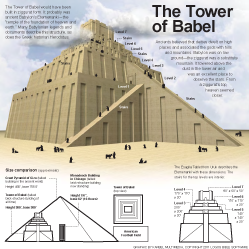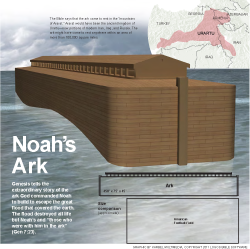24:1–23 The oracles against the nations culminate in a pronouncement of cosmic judgment against the whole earth. Worldwide disaster, sitting in the background of the oracles presented in chs. 13–23, now comes to the fore in chs. 24–27. The scene of judgment evokes imagery from the ancient stories of Gen 1–11—especially the flood story and the Tower of Babel incident. |
24:1 is about to lay the earth waste and is about to devastate it Compare Isa 13:9, where the day of Yahweh comes and makes the land desolate.
he will twist her surface In the oracles against the nations, other nations often serve as the agents of God’s judgment. In this cosmic judgment, the earth itself becomes the agent via an earthquake.
he will scatter her inhabitants The same Hebrew word for scattering is also used in Gen 11:9, where God judges the people for building the Tower of Babel.
24:2 as with the people, so with the priest All levels of society—weak to powerful, rich to poor—will be affected by this judgment. In an invasion, the upper classes often had the most to lose. The average person simply exchanged one overlord for another.
24:3 The earth shall be utterly laid waste The result of the cosmic judgment. May resemble the empty earth awaiting God’s creative word (Gen 1:3), or the empty post-flood world in Gen 9:1.
24:4 The earth dries up, it withers Echoes the localized judgment against Moab in Isa 16:8 or the mourning of the land in Hos 4:3.
24:5 the earth is defiled beneath its inhabitants God brought about the flood in Gen 6:5–7 because of the general wickedness infecting the entire creation. The Law also included warnings about polluting or defiling the land (see Num 35:33).
they have broken the everlasting covenant If only Judah or Israel are in view, the covenant refers to the Mosaic covenant—the Israelites have failed to keep the law. However, the larger context of Isa 13–23 suggests the indictment here is against all peoples, not just Judah.
refers to the Mosaic covenant—the Israelites have failed to keep the law. However, the larger context of Isa 13–23 suggests the indictment here is against all peoples, not just Judah.
24:6 a curse devours the earth Formal covenants in ancient Near Eastern history were solemnized by a list of the curses that fell on whichever party broke the agreement (compare Deut 28:15–68).
few men are left Judgment leaves only a small remnant—just as in the flood story, where only Noah and seven others survived on the ark. See Isa 1:9.
24:10 The city of emptiness The identity of the city or town is unclear. The nameless city can symbolically represent urban human civilization. The image contrasts with the “faithful city” of 1:21 or the future “city of righteousness” in 1:26, which use the same Hebrew term for city or town.
24:13 like the beating of an olive tree Using the same agricultural imagery of 17:6, this invokes the futile attempt to find any fruit after the harvest was complete.
24:15 glorify Yahweh in the east The scene shifts to a future time when all the world worships Yahweh, a familiar theme for Isaiah (see 2:2–4 and 19:19–25).
24:16 Woe to me Isaiah similarly expresses dismay during his vision of God in 6:5. His reaction here seems linked to the immensity of the coming destruction of the cosmic judgment.
The treacherous ones deal treacherously Compare the prophet’s reaction to his vision in 21:2–4. The same image of betrayal and destruction is found in 21:2–4 and 33:1.
24:18 shall fall into the pit Describes inescapable judgment. The terror, pit, and snare create a poetic image of God’s judgment (compare Jer 48:43–44).
the windows from heaven are opened In Gen 7:11, the flood begins when the windows (or floodgates) of heaven are opened. The flood itself and the image of water as a destructive force allude to the chaotic conditions of creation before God brought order by dividing the waters in Gen 1:6.
the foundations of the earth tremble God’s creative power also set the earth on its foundations (see Prov 8:29). Cosmic judgment is presented as an undoing of creation (see Jer 4:23–24).
24:21 on that day Alludes to the coming day of Yahweh in total judgment over first earth, then heaven. The phrase is common in Isaiah, giving a repetitive cadence to oracles of judgment. The phrase is used seven times from Isa 24–27 (25:9; 26:1; 27:1–2, 12–13).
the host of heaven in heaven Possibly a reference to fallen angels or to the idolatrous worship of celestial bodies outlawed in Deut 17:3.
or to the idolatrous worship of celestial bodies outlawed in Deut 17:3.
24:23 the full moon will be ashamed The moon is likely referenced as a heavenly body that was worshiped idolatrously. See Isa 24:21 and note.

|
About Faithlife Study BibleFaithlife Study Bible (FSB) is your guide to the ancient world of the Old and New Testaments, with study notes and articles that draw from a wide range of academic research. FSB helps you learn how to think about interpretation methods and issues so that you can gain a deeper understanding of the text. |
| Copyright |
Copyright 2012 Logos Bible Software. |
| Support Info | fsb |
 Loading…
Loading…


